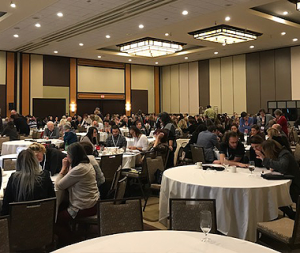Ministry expert speaks at international symposium on Restorative Justice

11 November 2017
New Zealand’s pioneering approach to restorative justice has been recognised at a symposium in Canada during international Restorative Justice week (19 to 26 November).
Hayley MacKenzie, from the Ministry of Justice’s Provider and Community Services Unit, was one of two key note speakers at the symposium held in Ottawa
She shared how New Zealand’s “people centred” approach to restorative justice draws on Māori cultural practices of involving the whole community to restore balance when a wrong has been committed.
Restorative justice aims to hold offenders to account for their offending and help repair the harm they’ve done to the victim and the community.
Restorative-type practices, such as family group conferences, were first included in New Zealand legislation through the 1989 Children, Young Persons and Their Families Act (now the Oranga Tamariki Act).
‘Early legislation in New Zealand did not explicitly use the term “restorative justice” but it effectively took us into a space where we offered a choice to victims and offenders outside of “traditional” justice,’ Hayley says.
‘Research into the effectiveness and impact of restorative justice shows it reduces reoffending rates. Reoffending analysis for restorative justice cases 2008-2013 [PDF, 553 KB] found that offenders who had been through a restorative justice process had a 15% lower rate of reoffending than comparable offenders over the following 12-month period.
‘Additionally, the vast majority of victims feel it is beneficial. For example, restorative justice gives victims a chance to express their feelings directly to the offender. That’s something they tell us helps them heal and move on with their lives.’
More than 80 percent of victims who took part in the 2016 Ministry of Justice Restorative Justice Victim Satisfaction Survey 2016 (PDF, 774KB)(external link) reported they felt satisfied with their overall experience of restorative justice.
Polly O’Brien, Manager, Provider and Community Services , said the Ministry and local service providers continually strive to ensure restorative justice helps put things right.
‘We support 26 restorative justice providers around New Zealand and, through the introduction of our Restorative justice: Best practice framework 2017 [PDF, 553 KB], we are working to establish a common approach that ensures safe, consistent and robust restorative justice practice in New Zealand,’ says Polly.
‘The invitation to a Ministry expert to share New Zealand’s restorative justice journey, including the work of local providers, in an international setting, is a positive reflection of our joint efforts in helping give victims of crime a voice,’ she said.
The symposium ran from 19 to 21 November was jointly hosted by the Collaborative Justice Program: Restorative Justice Ottawa(external link) (external link) and the Church Council on Justice and Corrections based in Ottawa, Canada(external link)